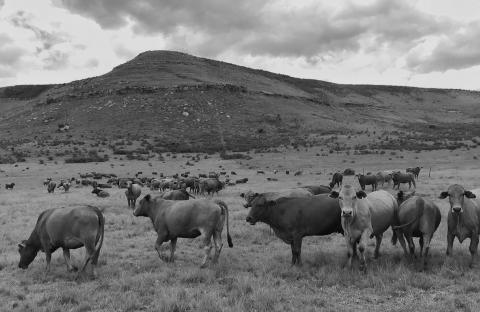
Introduction
vaṃśī-vibhūṣita-karān-navanīradābhāt
pītāmbarādaruṇa-bimba-phalādharoṣṭhāt |
mugdhendu-sundara-mukhādaravinda-netrāt
kṛṣṇāt-paraṃ kim-api tattvam-ahaṃ na jāne ॥ (śrī madhusūdana-sarasvatī)
He whose hand is adorned by the flute, with the hue of a new dark cloud,
He who’s dressed in a yellow garment, with ruddy lips resembling the bimba fruit,
With an innocent moon-like handsome face, the lotus-eyed,
Kṛṣṇa – beyond him, I do...
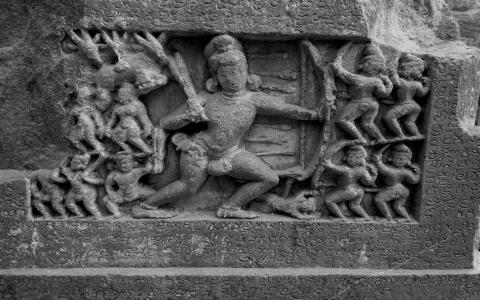
The object that is water, is H2O for a chemist, and ambrosia for a thirsty man. The satiating and refreshing potential imperceptible in hydrogen and oxygen was perceived by the mind of a thirsty man when they together touched his tongue.
Beauty is also the perceived state of “avyakta”. Eyes, ears, mouth, nose, cheeks and hair — these are present for all faces. All bodies are equally made of skin, blood vessels and bones to a surgeon. A chemist...
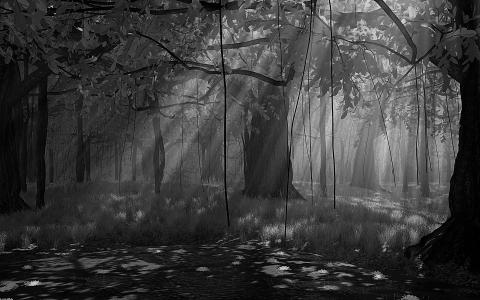
Thus, the Parabrahma is conducting the activities of the universe in three forms — prakṛti, jīva and Īśvara.
yāvatsaṃjāyate kiñcit sattvaṃ sthāvarajaṅgamam ॥
kṣetra-kṣetrajña-saṃyogāt (tad-viddhi bharatarṣabha) ॥
BG 13.27
Whatever is born in this world — whether it is a living being or an inanimate object — the instrument of its birth is the union of kṣetra and kṣetrajña, prakṛti and puruṣa, or the universe and jīva. They are both equally...

How is Brahma?
sarvataḥ pāṇipādaṃ tat sarvatokṣi-śiro-mukham ।
sarvataḥ śrutimalloke sarvam āvṛtya tiṣṭhati ॥
BG 13.14
“Its limbs are everywhere, as are its eyes and heads. It ’sarvam āvṛtya tiṣṭhati’ — pervades everything”. Here, we are reminded of the line “sahasraśīrṣā puruṣaḥ” from the Puruṣasūkta and the eleventh chapter of the Gītā.
sarvendriya-guṇābhāsaṃ sarvendriya-vivarjitam ।
asaktaṃ sarvabhṛt-caiva nirguṇaṃ guṇa-bhoktṛ ca ॥...

Introduction
ekam-evādvayam-arūpaṃ brahmam-avyayam-akriyaṃ
svīkarisi nijabhogakèṃdu śarīra-vividha-sahasramaṃ ।
prākṛtāsvādyagaḻa madhuviṃ tannane tāṃ maretavol
lokajīvana-sīṃdhu-vīciyoḻ ātmadī ḍolotsavaṃ ॥
Brahma is the One, without a second, formless, changeless and without action
Takes, a myriad varied forms, for its own pleasure
Seems as if it is lost in worldly pleasantness
This is the surf-fest of the ātma in the waves of the...

Śrī Kanakadāsa, the great mystic, said this -
Ṣaḍurasadannakè nalidāḍuva jihvè । kaḍurucigoṃbuva ruciguṇa ninadayya ॥
(Yours is the tongue that enjoys food with six rasas;
yours is the nature that deeply relishes all tastes)
The beauty, the very essence of the things that are present in the universe, the senses that experience them, and their capability to discern and enjoy belong to Bhagavān.
annaṃ ca brahma । bhoktā ca brahma ॥
(...

Well, then, is this path — performing one’s duties with the sole purpose of pleasing Bhagavān — an easy journey? Śrīkṛṣṇa himself was uncertain about it. Bhagavān is not in front of our eyes; dharma is not in front of our eyes either. Performing our duties only for the sake of Bhagavān or for dharma — single-minded devotion to our duty without even an iota of selfishness — is difficult. It is not easy to be a devoted servant who does his duties...
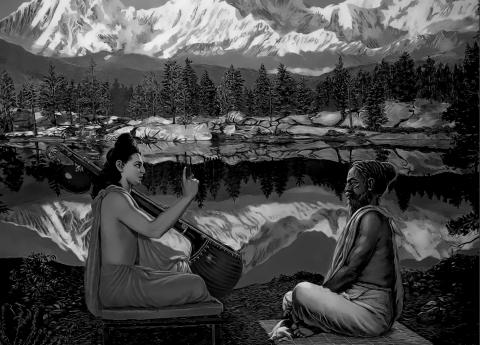
Introduction
dhyānābhyāsa-vaśīkṛtena manasā tannirguṇaṃ niṣkriyaṃ
jyotiḥ kiñcana yogino yadi paraṃ paśyanti paśyantu te ।
asmākaṃ tu tadeva locana-camatkārāya bhūyāc-ciraṃ
kālindī-pulinodare kimapi yan-nīlaṃ maho dhāvati ॥
dhyānāhbyāsadè tattvamaṃ hṛdayadoḻ tāṃ-ā nirākāramaṃ
kāṇalk-appoḍè kāṇge yogivarar-āṃ sāmānyar-èmmakṣig-ā ।
veṇu-svāna-sudhā-prasādi yamunā-kuñjodara-āmodi me-
ghānīla-dyuti nāṭyavāḍuge sadā nāṃ dhanyar-ā līleyiṃ...
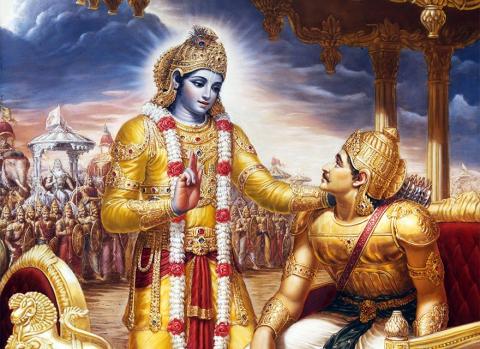
Śrī Kṛṣna was satisfied with this entreaty; Arjuna had been put on the path; his internal transformation was complete. Bhagavān felt certain that Arjuna was ready to perform the requisite deeds.
mā te vyathā mā ca vimūḍha-bhāvo
dṛṣṭvā rūpaṃ ghoram īdṛṃ mamedam |
vyapeta-bhīḥ prīta-manāḥ punas tvaṃ
tad eva me rūpam idaṃ prapaśya ||
BG 11.49
“Be free of worry and confusion. You were frightened because of the vision of my terrifying form...
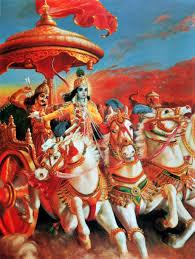
Here, by “divine eyes” we do not need to imagine a pair of extra-physical eyes with their own eyeballs and eyelids. It is enough to think that Bhagavān endowed the eye with the ability to behold divine effulgence. This is what we have to understand - when we pray to Īśvara for a boon, we need to ask for the requisite strength to bear and control the blessing. Our desires know no limits and make us forget what is suitable and what is not. If...
